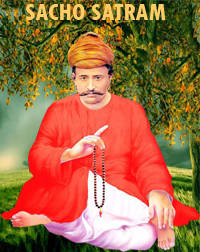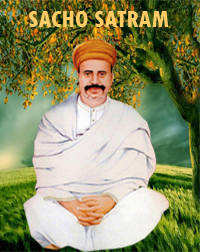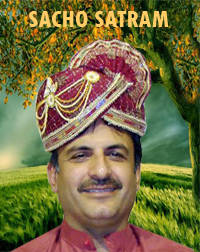
Devotees’Chain, the Chain of Devotion.
In a significant Satsang, to the devotees’chain, Hazir Swaroop Sai Sadhram Saheb eloquently elucidates the significance of various forms of donations and temple service.
People often ponder why, given the immense power of our Satguru, human beings are still encouraged to engage in seva (selfless service), maintenance, various forms of devotion, and contributing donations for the construction of temples. In a divine discourse, Hazir Swaroop Sai Sadhram Saheb eloquently elucidated the underlying purpose of why our Satguru wishes for humanity to actively partake in selfless service within the temple and offer their blessings to this sacred place.
Hazir Swaroop Sai Sadhram Saheb conveyed that through selfless service and active involvement in acts of kindness, charity, generosity, and philanthropy, individuals attain worthiness in the eyes of Parmatma. This leads to the accumulation of divine blessings and the realization of genuine freedom in both their present lives and the hereafter.
When circumstances prevent us from carrying out seva, it’s advisable not to assert that we “cannot” do it due to the absence of resources. Using negative words can propagate negativity. Instead, we should acknowledge that we are choosing not to engage in seva. It’s acceptable to state, “I’m not doing it,” but declaring that “I don’t have it” is unwise.
If you possess the capability to engage in seva and willingly choose to do so, planting the seed of seva yields bounteous joy. Even when trials and sorrows attempt to enter your life, the overflowing and exceedingly abundant happiness will ultimately dispel those sorrows.
The devotee chain is deeply linked to the emotions of love and sentiment, extending its reach beyond familiar faces to embrace a wide and inclusive community.
The aim is to unite individuals from across the globe, allowing everyone to collectively share in the blessings of Parmatma and shape their destinies through selfless service. Parmatma, the sole provider for the entire universe, is at the heart of our shared mission to bring people together.
When two Brahmins came to meet Shahanshah Satguru Sai Satramdas Saheb as he was concluding his spiritual gathering in the city of Thul, they approached him with a humble request for financial assistance, seeking Rs. 300 to support their daughter’s wedding. Shahanshah Satguru, who was still engaged in meeting the people of Thul before his departure and had not yet taken his seat in the carriage, lifted a cloth potli and handed it to the Brahmins. To their astonishment, upon opening it, they discovered not Rs. 200 but Rs. 500. Expressing their need for only three hundred, the Brahmins conveyed their gratitude to Saijan. In response, he advised them to keep the entire amount of Rs. 500 and encouraged them give the extra money of Rs 300/ to their sons to invest in launching a business, for self-sufficiency so that they wouldn’t have to depend on others for financial support in the future. What was particularly remarkable about this moment was that Saijan, despite not yet departing, had not even seated himself in the horse cart; he simply raised the seat to retrieve a potli of money to offer to the Brahmins.
The sudden appearance of the potli was truly astonishing. Shahanshah Satguru possessed immense powers, being omnipotent, omniscient, and omnipresent. During his Bhakti programs, Saijan would graciously accept the offerings presented to him and, following the event, he would selflessly distribute all these offerings among the impoverished and those in need.
Why did Shahanshah Satguru, who wielded extraordinary powers to aid people, choose to accept offerings from others? Saijan imparted a profound lesson in this practice. He taught us that by accepting offerings in the name of God and subsequently using those offerings to support the underprivileged and those in need through volunteering and charitable donations, we enable people to directly or indirectly engage in virtuous deeds. This, in turn, helps them shape their destinies and earn the blessings of Parmatma, allowing them to alleviate themselves from the burdens of their karmas and attain unity with Parmatma.
The Devotee chain is not focused on accumulating wealth; rather, its purpose lies in uniting individuals to collectively engage in acts of kindness, fostering a connection with moral and ethical conduct, and facilitating the experience of the grace that shapes their destinies.
The aim is to unite everyone because there may be people who are unaware of these acts of kindness, others who are unable to personally participate, and some who may not know how to get involved. By encouraging people to partake in such benevolent actions, even those facing adversity in their lives can gradually change their fortunes. Those who make the effort to bring everyone together and share their good fortune through such acts also reap the benefits, finding true happiness and contentment while carrying their good luck forward into the future.



